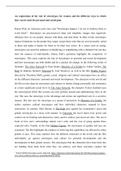An exploration of the role of stereotypes for women and the different ways in which
they can be used for personal and social gain.
Danny Pudi, an American actor once said "Stereotypes happen. I try not to embrace them or
avoid them"1. Stereotypes are preconceived ideas and simplistic images that negatively
influence how we see people, interact with them, and treat them. In other words, stereotypes
impose limitations on the people they target, assign them roles that are not necessarily suited
to them and make it harder for them to be their true selves. In a career such as acting,
stereotypes can assist the audience in identifying or empathizing with a character but can also
limit the nuances of individuality. Danny Pudi’s quotation highlights the complexity of
stereotypes. This essay explores the role of stereotypes on personal and social development
and how stereotypes can both inhibit and be a catalyst for change. In the following works of
literature: The Alice Network by Kate Quinn, Memoirs of a Geisha by Arthur Golden, The
Help by Kathryn Stockett, Educated by Tara Westover, as well as the film Hidden Figures
directed by Theodore Melfi, gender, racial, religious and cultural stereotypes have an effect
on the different characters’ personal and social development. The characters in the novels and
the film revoke deep-set stereotypes and cultures to initiate change personally and sometimes
at a more significant social level. In The Alice Network, the character Evelyn Gardiner uses
the stereotypical belief that women can only perform menial and unthreatening roles in the
war. She uses the stereotype to her advantage and carries out significant acts in a secretive
manner. She also uses the stereotype as a means of protection. In Memoirs of a Geisha, the
author explores cultural stereotypes and how individual characters respond to these
restrictions. In contrast, Miss Skeeter in The Help goes against her community's racial and
gender stereotypes in a more overt manner. In Educated, the novel shows how power and
control can be limiting and destructive when used to enforce preconceived roles. The novel
looks at how one’s surroundings impact one’s roles and the cost of going against these
expected roles. Finally, in the film Hidden Figures, the stereotypes of gender and race are
examined. The film highlights the madness of believing that capabilities are affected by either
gender or race. This essay explores how the different characters in the novels and the film
individually go against stereotypes and culture for personal development and the
development of their greater society. The stereotypes that the characters have been born into
are holding them back from what they can achieve, and these storylines explore the
1
Pudi D (2020) stereotype quote, Kalemati, https://kalemati.net/tq/Stereotype/251139/Stereotypes-happen.-
I-try-not-to-embrace-them-or-avoid-them(04-05-2021)
, character's unique way of both " not embrac[ing] [nor] avoid[ing]"2 stereotypes that limit who
they can be.
The Alice Network‘s inspiration came from the experiences of real-time female spies during
World War l. The character, Evelyn Gardiner, stands against the restricted roles designed for
women during the First World War. Roles such as manufacturing, medical, translation,
administrative and agricultural positions. Evelyn prefers to be in a position “reserved for a fit
man.”3 While living in her boarding house, her roommate proclaims “[Evelyn] should come
work at the hospital. That’s where [she] will find a husband”4 but she “[does not] much care
about finding a husband.”5 Her statement earns her "blank looks from the nurse and the
landlady and the other two borders”6 because women who have no aspiration to start a family
are automatically assumed to be taking up the role of a suffragette. Both her desire for a non-
conventional working role, together with her lack of interest in finding a husband makes
Evelyn very different to the normal woman. It is exactly these qualities that link all the
female-spies working in the Alice Network, their beliefs and behaviour are considered
atypical and even strange. During this time, a woman who wanted to help in the war,
additionally to her given positions, is “considered suicidal”7. However, “if [she] were a man
[everyone would] be calling [her] patriotic to wish to continue in [her] duty to [her]
country.”8 Evelyn’s character throughout the novel sheds light on all the sacrifices female
operatives made in the name of patriotism during the Great War and how crucial they were to
the war effort9. Evelyn sacrifices her” home, safety, virginity, even her name all for the
benefit of her country.”10 She is aware “[women] frequently have the ability to pass
unnoticed.”11 She uses this together with the fact that she has a speech impediment to her
advantage because “people talk around women, and they talk even more around girls, and
2
Pudi D (2020) stereotype quote, Kalemati, https://kalemati.net/tq/Stereotype/251139/Stereotypes-happen.-
I-try-not-to-embrace-them-or-avoid-them(04-05-2021)
3
Kate Quinn, The Alice Network (HaperCollins:2017),31
4
Kate Quinn, The Alice Network (HaperCollins:2017),26
5
Kate Quinn, The Alice Network (HaperCollins:2017),26
6
Kate Quinn, The Alice Network (HaperCollins:2017),26
7
Kate Quinn, The Alice Network (HaperCollins:2017),327
8
Kate Quinn, The Alice Network (HaperCollins:2017),327
9
Debbie Stewart (8 December 2017). The” Queen of spies” during the world wars, Great Falls
Tribune, https://www.greatfallstribune.com/story/life/2017/12/08/queen-spies-through-world-
wars/929155001/ (4 Junes 2021)
10
Kate Quinn, The Alice Network (HaperCollins:2017),267
11
Kate Quinn, The Alice Network (HaperCollins:2017),57




